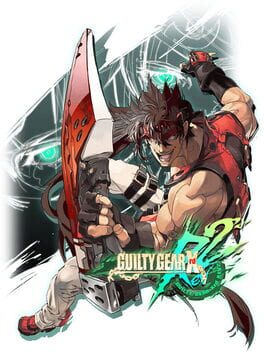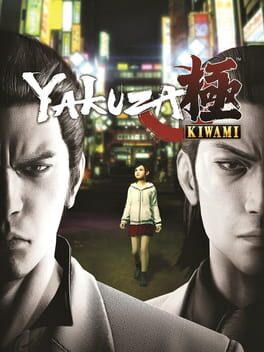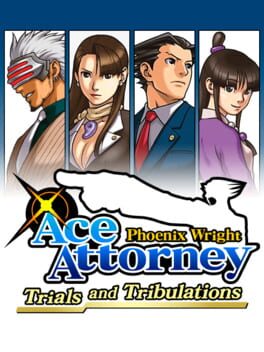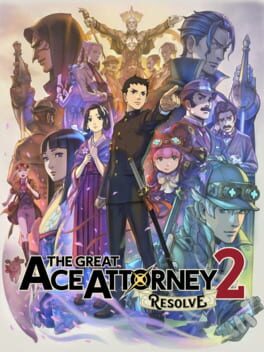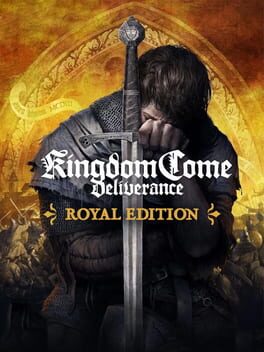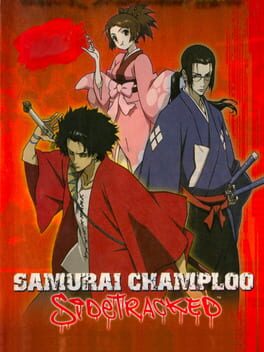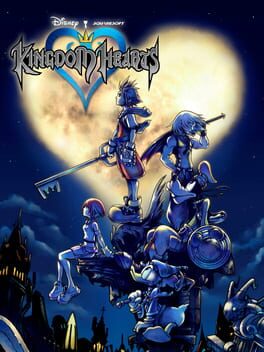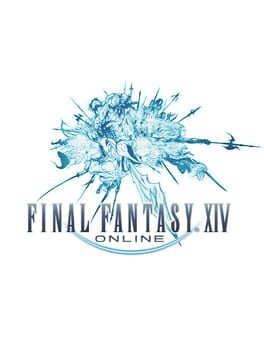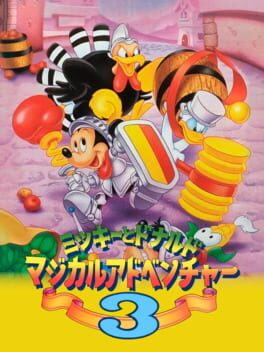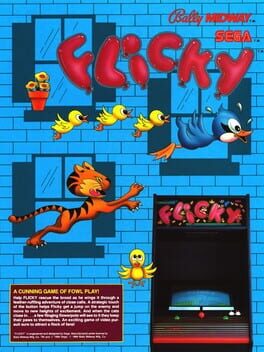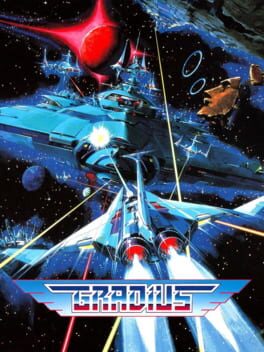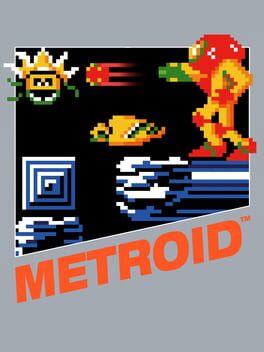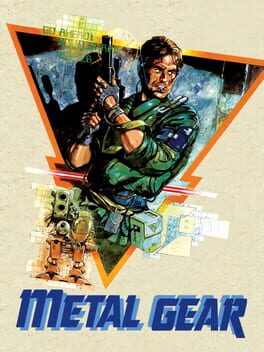joaogames123
100 reviews liked by joaogames123
eu sempre fui da opinião de que jogo de luta é um artifício de auto-expressão: apesar de ter um meta e o povo adorar fazer tier list, a ideia toda é mais individualista - escolher o boneco que mais gosta esteticamente ou o que acha mais fácil mecanicamente e aí conversar com o oponente se utilizando das ferramentas de cada personagem, como um dialeto. as histórias de Sempre Querer Ficar Mais Forte ou Encontrar Um Oponente À Altura e Superar Os Próprios Limites de séries como street fighter conversam muito com a teoria do esporte, então é normal que haja uma sobreposição entre essa meritocracia narrativa e a de quem gosta de mostrar o momento evo 37 para os entes queridos e aproveitar pra explicar como funciona taxa de quadros, etc
o que se revelou pra mim nas últimas semanas de Estudo De Guilty Gear é que eu não tenho mais a ambição de aprender a jogar um jogo de luta como tinha antes. nem é questão de idade ou tempo (a gente se dedica ao que quiser), e sim de que meus interesses mudaram. eu troquei de casa e meu controle de fliperama ficou na antiga. eu não assisto mais evo e nem vejo partidas no youtube. meu último contato com a cena foi jogar o modo história de tekken 7 assim que a pandemia começou.
isso tudo é relevante pra revelação (2): mesmo sem me importar com a parte Jogo de Luta de um jogo de luta, Guilty Gear é uma Obra Completa. a estrutura de jogar o arcade mode só como um prologozinho pro modo história que é simplesmente um filme de 6 horas sem nenhuma interação do jogador no meio casa perfeitamente com a minha vontade de ver o mundo que existe atrás dos cenários das lutas sem o jogo ter que criar justificativas absurdas pra ter uma lutinha a cada dez minutos. isso mostra um respeito à própria ficção que só pode existir quando você não a vê como uma limitação de expectativas. "tem um jogo de luta complexo e profundo e, acima de tudo, estilosíssimo aqui, mas não vou deixar isso atrapalhar a história que eu quero contar só pra seguir a estrutura que foi estabelecida por outras pessoas antes."
GG não é um jogo em que você se expressa através dos personagens. conforme você começa a querer explorar eles além das cenas e jogar com eles e até abrir os lobbies online pra jogar uma rankeadinha de vez em quando, a ideia de verdade vai se mostrando: eles são tão idiossincrásicos que são eles que se expressam através de você. você é uma extensão do modo história. o online é o recreio.
o que se revelou pra mim nas últimas semanas de Estudo De Guilty Gear é que eu não tenho mais a ambição de aprender a jogar um jogo de luta como tinha antes. nem é questão de idade ou tempo (a gente se dedica ao que quiser), e sim de que meus interesses mudaram. eu troquei de casa e meu controle de fliperama ficou na antiga. eu não assisto mais evo e nem vejo partidas no youtube. meu último contato com a cena foi jogar o modo história de tekken 7 assim que a pandemia começou.
isso tudo é relevante pra revelação (2): mesmo sem me importar com a parte Jogo de Luta de um jogo de luta, Guilty Gear é uma Obra Completa. a estrutura de jogar o arcade mode só como um prologozinho pro modo história que é simplesmente um filme de 6 horas sem nenhuma interação do jogador no meio casa perfeitamente com a minha vontade de ver o mundo que existe atrás dos cenários das lutas sem o jogo ter que criar justificativas absurdas pra ter uma lutinha a cada dez minutos. isso mostra um respeito à própria ficção que só pode existir quando você não a vê como uma limitação de expectativas. "tem um jogo de luta complexo e profundo e, acima de tudo, estilosíssimo aqui, mas não vou deixar isso atrapalhar a história que eu quero contar só pra seguir a estrutura que foi estabelecida por outras pessoas antes."
GG não é um jogo em que você se expressa através dos personagens. conforme você começa a querer explorar eles além das cenas e jogar com eles e até abrir os lobbies online pra jogar uma rankeadinha de vez em quando, a ideia de verdade vai se mostrando: eles são tão idiossincrásicos que são eles que se expressam através de você. você é uma extensão do modo história. o online é o recreio.
Xenogears
1998
It’s no secret to anyone who knows me that story is what I value most in a game, and ever since I started getting into JRPGs, Xenogears has been one of the ones that caught my attention the most. This interest only intensified after one of my friends finished it. I always heard that it was a game with an excellent narrative but severely hindered by development issues, mostly related to budget and time, and… yeah, it was true. Everything related to Xenogears’ gameplay seems poorly planned in some way, starting with the human combat, which initially seems interesting, working quite differently from the rest of the genre. Here, instead of defined turns for each participant with one action possible per turn, we have a combo system. Each character has a certain amount of Attack Points (AP) per turn, starting at 3 and ending at 7 as the characters level up, and three types of attacks: weak, medium, and strong, each requiring 1, 2, and 3 AP respectively. It’s possible to keep attacking as long as there’s AP left, and different attack combinations unlock special end-of-turn moves called Deathblows, which act as specials and deal significantly more damage. Thus, you are encouraged to always vary the combos you perform to discover new Deathblows, and of course, the combinations only increase and become more complex as more AP is gained. But quickly, the novelty of this system wears off, and all that remains is repetitive, often unfair, and very, very, VERY slow combat. Slow to the point that playing with the emulator's turbo activated feels like the normal speed the combat should happen at. Learning Deathblows requires the combinations to be repeated numerous times, resulting in the player spamming the same sequences dozens of times in a row, which obviously becomes boring quickly. As usual for games of the genre, we also have magic or skills, but all except for the healing ones are extremely useless. I can count on my fingers the times it seemed advantageous to spend a turn using them instead of just attacking normally. There’s practically no challenge; most bosses consist of just healing while building up a bar that allows you to use a sequence of consecutive Deathblows to deal massive damage at once and defeat them easily. Money is also abundant for the first 80% of the game, so having the best equipment and infinite healing items is very easy, contributing to making everything even more tedious. On the other hand, we have the combat in mechas or Gears, which visually is incredible. The attack animations are extremely well done (this also applies to the human combat), the Gear models are very well crafted, and the HUD that resembles a real command screen is quite cool, but it suffers from as many problems as the previous combat. The main issue is the fuel meter; each Gear has a limited amount that changes depending on the equipped engine (engine, frame, and armor are the three parts that can be upgraded in a Gear). Each attack or skill consumes a certain amount of fuel, and if it runs out, you can basically say goodbye to that attempt and reload the save, as until the end of the game, the only way to recover fuel is by selecting the option in the battle menu, which spends a turn and recovers ~50 each time, which is a negligible amount. To give you an idea, the engine with the least amount of fuel has 1000. Yes, recovering 50/1000 PER TURN. In the first half of the game, it’s quite difficult to run out, but as you unlock more powerful Deathblows (which, consequently, consume more fuel) and when you unlock the action to heal the Gear (which consumes at least 400 fuel), you have to severely limit the actions you take to avoid running out of reserves before halfway through the fight. Some Gear bosses are ridiculously unfair, with attacks that quickly deplete your HP bar, forcing you to heal and consume fuel. Of course, you can break the game if you know which items to equip on which characters, but playing blindly is hellish. And it doesn’t stop there; remember the parts I mentioned above that can be upgraded? So, you upgrade them in shops scattered throughout the game, and the parts are expensive. But as I mentioned in the previous section, money is abundant in the first half, but in the second, prices inflate too much, and it’s practically impossible to have enough money to equip all the Gears with the best equipment without grinding. I can’t stress enough how necessary it is to have the best parts equipped if you want the slightest chance of beating the bosses. And there’s more; it’s a JRPG, so of course, there will be dungeons. As you might have guessed, they are also terrible. Most are straight lines with a few deviations here and there for treasure chests, and the ones that try to be more complex are even worse, becoming extremely confusing, and not in a good way like Megami Tensei, just in an annoying way. And of course, with the encounter rate through the roof. One, in particular, even tries to have platforming sections, PLATFORMING. WITH. ROBOTS. ON. PLAYSTATION 1. It doesn’t take a genius to imagine how poorly this controls and how imprecise it is. To wrap up the gameplay part, the world map is pretty bland; there are no side activities to do until right before entering the last dungeon, and even when they do appear, they are mediocre. It seems more like an excuse to take the player where they need to go rather than a world that's genuinely fun to explore. But at least the interactions and dialogues with NPCs in the cities are very good. Everything exudes inexperience, which is due to the fact that the team was really inexperienced. Most of the developers were new to the market, and the director himself, Tetsuya Takahashi, despite having worked in important positions in some Final Fantasy games, was only 22 at the time, and it was the first project he was directing alone. Understanding this, it’s clear where most of the numerous gameplay flaws came from.
Leaving hell behind and talking about good stuff, more than good actually, the story is exceptional. Almost all the main concepts and characters introduced have perfect arcs and conclusions. The dialogues are masterfully written, and the way everything makes sense in the end is brilliant. “Brilliant” is what you’ll find yourself repeating when trying to find words for this game’s plot. The way the game handles the psychology mainly of the protagonist, but also of other characters, is brilliant, heavily relying on the studies of Freud, Jung, and Lacan. Having at least a basic understanding of these figures’ work is crucial to fully grasp the story. The way the game deals with human relationships on all fronts—love, rivalry, friendship, enmity, selfishness, conflict with others and with oneself—is brilliant. Kaori Tanaka is easily one of the best writers to have worked in the industry. The few criticisms that can be made are related to some party characters who fall into the background for most of the plot after their arcs end and concepts that are quickly forgotten after being introduced, which are relevant to the plot, but nothing truly hinders it. Even hating the gameplay, I never felt like dropping it. The curiosity and desire to see how the narrative unfolds keep anyone playing until the end, and almost all the characters have extremely unique and charismatic personalities. Even in dialogues that don’t add much to the story, you remain interested simply because of who the characters are. Fei, Elly, Krelian, Citan, and Grahf certainly make it into my ranking of best characters of all time. It’s really something you don’t see in any game, even those focused on story. This is on par with the best stories ever told, and maybe, it’s really my favorite.
Graphically, the game is impeccable. It abandons the static backgrounds common in Square’s RPGs of the time and adds fully 3D environments with 2D character sprites, à la Persona 2, resulting in a beautiful visual. The art direction at several moments is breathtaking, and the rare pre-rendered 3D scenes are extremely cool. In combat, instead of the horrible models of Final Fantasy VII and VIII, we also have 2D sprites, which, like the Gears, are extremely well animated and beautiful. The only downside of the environments is that sometimes the camera simply doesn’t have a good angle to stay at, but it doesn’t interfere much.
The soundtrack stands alongside the best of the era. Unfortunately, there are very few songs, so you’ll hear the same tracks over and over again, which quickly becomes boring, but when a new composition appears, it’s another masterpiece.
Now, the elephant in the room... even if you haven’t played it, there’s a chance you’ve heard about the infamous second disc. It was here that the budget and time issues worsened, causing various gameplay sections to be left out and replaced with walls of text narrating what happened. Let’s face it, not having more sections of this wonderful gameplay isn’t a big loss, but it’s still disappointing to have a dungeon narrated to you instead of playing it. The real problem is that even some story parts, which would clearly be cutscenes, receive the same treatment. Unfortunately, chances for a remake of this game are rare, so the magnificent story has to be experienced in a less than ideal state, but it’s what we have.
In the end, despite several stumbles and parts that made me tear my hair out, Xenogears is an experience I will never forget, and I will always cherish it as one of the most engaging and brilliant stories I’ve ever consumed. I’m looking forward to seeing how the spiritual successors continued the legacy that started here. 9/10.
Leaving hell behind and talking about good stuff, more than good actually, the story is exceptional. Almost all the main concepts and characters introduced have perfect arcs and conclusions. The dialogues are masterfully written, and the way everything makes sense in the end is brilliant. “Brilliant” is what you’ll find yourself repeating when trying to find words for this game’s plot. The way the game handles the psychology mainly of the protagonist, but also of other characters, is brilliant, heavily relying on the studies of Freud, Jung, and Lacan. Having at least a basic understanding of these figures’ work is crucial to fully grasp the story. The way the game deals with human relationships on all fronts—love, rivalry, friendship, enmity, selfishness, conflict with others and with oneself—is brilliant. Kaori Tanaka is easily one of the best writers to have worked in the industry. The few criticisms that can be made are related to some party characters who fall into the background for most of the plot after their arcs end and concepts that are quickly forgotten after being introduced, which are relevant to the plot, but nothing truly hinders it. Even hating the gameplay, I never felt like dropping it. The curiosity and desire to see how the narrative unfolds keep anyone playing until the end, and almost all the characters have extremely unique and charismatic personalities. Even in dialogues that don’t add much to the story, you remain interested simply because of who the characters are. Fei, Elly, Krelian, Citan, and Grahf certainly make it into my ranking of best characters of all time. It’s really something you don’t see in any game, even those focused on story. This is on par with the best stories ever told, and maybe, it’s really my favorite.
Graphically, the game is impeccable. It abandons the static backgrounds common in Square’s RPGs of the time and adds fully 3D environments with 2D character sprites, à la Persona 2, resulting in a beautiful visual. The art direction at several moments is breathtaking, and the rare pre-rendered 3D scenes are extremely cool. In combat, instead of the horrible models of Final Fantasy VII and VIII, we also have 2D sprites, which, like the Gears, are extremely well animated and beautiful. The only downside of the environments is that sometimes the camera simply doesn’t have a good angle to stay at, but it doesn’t interfere much.
The soundtrack stands alongside the best of the era. Unfortunately, there are very few songs, so you’ll hear the same tracks over and over again, which quickly becomes boring, but when a new composition appears, it’s another masterpiece.
Now, the elephant in the room... even if you haven’t played it, there’s a chance you’ve heard about the infamous second disc. It was here that the budget and time issues worsened, causing various gameplay sections to be left out and replaced with walls of text narrating what happened. Let’s face it, not having more sections of this wonderful gameplay isn’t a big loss, but it’s still disappointing to have a dungeon narrated to you instead of playing it. The real problem is that even some story parts, which would clearly be cutscenes, receive the same treatment. Unfortunately, chances for a remake of this game are rare, so the magnificent story has to be experienced in a less than ideal state, but it’s what we have.
In the end, despite several stumbles and parts that made me tear my hair out, Xenogears is an experience I will never forget, and I will always cherish it as one of the most engaging and brilliant stories I’ve ever consumed. I’m looking forward to seeing how the spiritual successors continued the legacy that started here. 9/10.
Yakuza Kiwami
2016
Ótimo jogo com muitas coisas problemáticas, que claramente são consequências de um remake feito de forma preguiçosa. A história é realmente boa, talvez eu esteja sendo burro de dizer isso, mas é uma das poucas histórias da época do PS2 que são boas e não são de um RPG, mas infelizmente ela claramente não envelheceu bem, gosto bastante do começo e do meio, é uma história simples com um mistério interessante e um pacing bom, o problema tá mais na reta final, que o jogo mete uma conspiração mal feita e uma série de diálogos expositivos pq já tá no final e a RGG não tinham mais tempo pra desenvolver a história, mas mesmo com os problemas é uma história boa e divertida, com uns momentos bonitos (e um pouco toscos).
O combate é provavelmente a única coisa que é melhor nesse jogo do que no zero, os inimigos são mais espertos, eu constantemente mudava os estilos nesse jogo, eu até morri em alguns momentos por falta de cuidado. Meu maior problema em relação a gameplay, é que os bosses são paias demais, basicamente só o boss final que é realmente bom, pq todo resto é fds ou ruim, é incrível como erram tão feio nisso, e pelo que eu sei um dos bosses ruins é pior ainda nesse remake.
Mas o que realmente me deixou desanimado é o conteúdo secundário desse jogo, o Majima everywhere é realmente bem legal e criativo, mas puta merda parece que só focaram nele e esqueceram totalmente o resto, as sides na maioria dos casos é alguém tentando dar um golpe no Kiryu, enquanto isso os mini games são basicamente todos os do 0. Isso realmente deu uma pegada pra mim, eu esperava pelo menos uns mini games únicos, mesmo que seja só 2 ou 3.
Pode parecer que eu não gostei do jogo, mas ele é ótimo, história boa, combate bem gostoso e divertido, Majima everywhere sendo uma mecânica incrível e que gera uns momentos bem legais. Não é o melhor Yakuza, mas no final do dia é um jogo acima da média que vale muito a pena ser jogado
O combate é provavelmente a única coisa que é melhor nesse jogo do que no zero, os inimigos são mais espertos, eu constantemente mudava os estilos nesse jogo, eu até morri em alguns momentos por falta de cuidado. Meu maior problema em relação a gameplay, é que os bosses são paias demais, basicamente só o boss final que é realmente bom, pq todo resto é fds ou ruim, é incrível como erram tão feio nisso, e pelo que eu sei um dos bosses ruins é pior ainda nesse remake.
Mas o que realmente me deixou desanimado é o conteúdo secundário desse jogo, o Majima everywhere é realmente bem legal e criativo, mas puta merda parece que só focaram nele e esqueceram totalmente o resto, as sides na maioria dos casos é alguém tentando dar um golpe no Kiryu, enquanto isso os mini games são basicamente todos os do 0. Isso realmente deu uma pegada pra mim, eu esperava pelo menos uns mini games únicos, mesmo que seja só 2 ou 3.
Pode parecer que eu não gostei do jogo, mas ele é ótimo, história boa, combate bem gostoso e divertido, Majima everywhere sendo uma mecânica incrível e que gera uns momentos bem legais. Não é o melhor Yakuza, mas no final do dia é um jogo acima da média que vale muito a pena ser jogado
Phoenix Wright Ace Attorney Trials and Tribulations, easily a fan favorite entry in the series, and for reasons that are pretty easy to understand, compared to its predecessors, TnT has a far more dynamic story that feels a bit more like a full story rather than a few semi-connected episodes, it fleshes out old characters, introduces some new great ones, and wraps up the trilogy in a really satisfying way. Trials and Tribulations is a game I do love, though I do have some personal issues with it that sorta prevent it from being my favorite. Still though, this is an undeniable highlight of the series, though the gameplay is quite literally 100% unchanged from JFA which I do think is just a tad lame, but thankfully the soundtrack here is my favorite of the original trilogy, it kinda has a bit of a cheap-tune feel to it which I know isn’t everyone’s cup of tea (or coffee in this case), but the compositions here are still really catchy, epic, and emotional, even if there aren’t all too many new ones, with the game opting to reuse a lot of tracks from the earlier games which I’m cool with. Anyways, time to look at the cases!
Turnabout Memories starts the game with a REALLY compelling hook, putting you in control of Mia Fey during her second ever trial, depicting her first encounter with Phoenix Wright as she defends him in court, eventually managing to convict the infamous Dahlia Hawthorne. This set-up does a far better job at contextualizing the tutorials compared to The Lost Turnabout, it’s really fun getting to see Grosberg and Payne through this new lens, and it does a great job subtle hiding things from you which created further intrigue, it is Mia’s second trial after all. The murder itself is not all too complex, but being the first chapter of the game, it does a really great job, easily the best opener in the trilogy.
The Stolen Turnabout is a really fun and subversive one! Part of me does wish the premise a case where the crime isn’t murder wouldn’t have been dropped halfway through, as I think the series could really benefit from covering more non-homicide crimes, but at the very least the little bit we do get of the Mask☆DeMasque case is really cool. Ron Delite is a really great defendant, as soon as he starts screaming about being Mask☆DeMasque, you immediately think that’s BS, and proceed to prove him innocent of that, but later when it turns out he was telling the truth in order to avoid a different crime, it’s a really surprising and memorable twist. The highlight of the case though is easily its villain, Luke Atmey, who pulls off one of the absolute dumbest murder plans in the whole series which literally INVOLVED him getting arrested over theft to avoid his actual crime. He’s very much just a flat jerk, but man he’s just so fun, unraveling everything with him and the whole blackmail ring he has going on is just really enjoyable, and the final testimony where you have to hold one correct statement out of like 15 is really cool. it’s a simple fun dumb case, which is NOT a knock against it whatsoever. I love how it lets you acclimate back into the series and sorta transitions you from the second game to the third, supported by the returning Adrian Andrews, who’s just a joy to see actually doing a lot better with her life, even if not quite perfect. Maya and Pearl get a lot of fun screentime, We get to see Larry again who was MIA during the last game, and as always, we’re introduced to the game’s main prosecutor, this time being the weirdo coffee lover Godot, who I’ll touch more on in case 5, but for now I’ll just say is a really fun rival for the game. But anyways yeah! Not a highlight of the series or anything, but a really creative one nevertheless.
Recipe for Turnabout then is kinda also just a really dumb fun one, though it’s not really quite as creative as the case its following up. I feel like your enjoyment of this one kinda really depends on how much you really gel with the game’s humor, like you pretty much discover NOTHING during the first trial, kinda just dicking around with Victor Kudo for an hour, which I usually would’ve found frustrating, but its saved by the games great writing, with there being a lot of “funny moments™”. That mostly comes from everyone BUT Victor though, because he, alongside others like Jean Armstrong and Lisa Basil, I really don’t care much for at all. Viola Cadaverini is easily the biggest disappointment here though, she has a really cool design and backstory, but her arc kinda just abruptly ends out of nowhere which is really disappointing. My favorite character beats here probably come from Gumshoe and the returning Maggey Byrde who is once again the defendant. They have a pretty cute dynamic, and Gumshoe coming in clutch near the end is a really cool moment, it’s not really much of a focus, but you know it’s neat. Once again the villain is a highlight though, Furio Tigre is kinda just a really dumb angry guy who is inexplicably red yeah, but again, I find him funni so it’s cool. So yeah I think this case is good enough, though it does kinda feel undercooked (eh) in some places, like the whole setup at the start with the culprit pretending to be Phoenix and failing to defend Maggey on purpose is really cool! But the game really doesn’t do anything with that setup which is really lame, like you could completely write that plotpoint out and barely anything would really be hindered, it really just screams mispotential and I wish THAT part was played around with more. But I mean eh, the case is fun to play through, I like the crime method, motivation, and backstory associated, and the finale with Phoenix pulling a fast one on Tigre is really creative, which is good enough for me.
But alright, now we’re finally getting to the big boys! Turnabout Beginnings starts with one of my favorite case opening sequences in the series, the atmosphere with the cold blue computer screen taking a look back at the case from ages past is just really chilling in the best way possible. This being Mia’s first ever case, there’s both a neat sense of finally finding some answers to just what was fully going on in Turnabout Memories, but also a really great sense of dramatic irony, as you KNOW who Dahlia Hawthorne is and that she’s bad news, but also that Mia Fey is doomed to lose this trial. This cases strongest suit is EASILY its atmosphere, even past the opening the whole thing just has this dreary dark feel to it, with the blurry old photo of the decaying bridge upon with the crime was committed, and everything just feels a tad off, not even the judge is the same as usual, and you get to go against Miles Edgeworth at his absolute cockiest, which provides a lot of great moments, all leading up to that absolutely CHILLING climax where the defendant Terry Fawles literally commits suicide on the wittness stand, regardless of if he knew his actions would lead to that or not, it’s extremely chilling, and Diego Armando responding by literally breaking his coffee cup out of sheer rage, with the blood of his glass-scratched hands literally dripping down his arm, MAN it’s such a fucking strong moment something about it just feels like a taboo as REALLY been broken. It's really here where it’s semented to the player just how evil Dahlia really is, you know she’ll end up getting arrested which is cool, but still it’s impossible not to be furious here. I know that as the years have gone on, this case along with Dahlia herself have grown to be pretty divisive, what with the game painting her as a pure evil which, and the defendant who has a pretty large age gap dating her, I feel like the intent was that she was manipulating people into doing her bidding from even a young age, but yeah… looking back now it is kinda awkward which sucks, I can kinda overlook it because this didn’t bother me back when I first played TnT, seeing as I was too young to really understand what was so wrong with the situation, but I wouldn’t blame you if this aspect kinda puts you off the case. Still though, I really do love this one, it’s really engaging throughout, and set up the finale superbly.
And here we have it, Bridge to the Turnabout! The final case in the original trilogy and easily among the most beloved in the series. As a finale, this case honestly excels in pretty much every way, loose ends set up throughout the whole series thus far are neatly tied together, pretty much every major character from all games is presents, and it generally just ends in a really epic and memorable fashion, Though they don’t really progress the plot much, I love the segments in which Wright is out of commission and you get to take control of Edgeworth for the first time, he works surprisingly well as a protagonist, and this framework was basically what the Ace Attorney Investigations games would go on to be based on, Edgeworth is generally a lot more held back outside of the courtroom which is an aspect of his character I feel a lot of people tend to miss, his interactions with Gumshoe are great, and I love that he gets some semblance of peace with Fransizka. The case itself largely revolves around Iris, who mysteriously looks like Dahlia and is later revealed to be her twin sister, I personally like Iris, and I think the twist with her being the one who was dating Phoenix all along was good, but I do have some issues with how she connects to the overall plot, particularly I found her and Dahlia benign secretly connected to the Fey clan felt a tad forced in order to tie things together, and while I why it was done, I feel that this case goes a little too hard using spirit channeling as a crux, I was fine with it as long as it didn’t interfere with the crimes, but personally it just makes this murder plan feel sorta cheap, even if it’s really cool getting to see Maya’s mother, and Bikini is a really fun and likable witness. I know a lot of people really get annoyed with Larry here, but eh, again I think the court segment with him is funny enough. by the end, I do still really enjoy Dahlia Hawthorne’s role here and her take down, though she’s definitely far from the best villain in the series as the game could’ve portrayed her as a tad more gray, and when Iris asks you to forgive her, it really just feels like too little too late. And then we go to the final confrontation against the games TRUE final culprit, Godot, who’s easily one of the best characters in the trilogy, I know a lot of people dislike him because he’s kinda sexist, but to that I say: let characters have flaws, Godot literally commits murder, but it’s too much to like him just because he has cringe opinions on woman? Godot is a flawed character with dumb, twisted worldviews, but that just what makes him so compelling, he’s so hell bent on his petty revenge against Wright, but at the same time he’s willing to throw away pretty much everything just so that he could save Maya here, he’s wonderfly gray in the best way possible, his relationship with Mia is really believable I find, and MAN, it’s kinda just a plot dump, but the moment where he reveals his backstory and motives hits so hard every time, largely thanks to his second theme song, “The Bitter Taste of Truth” one of the best in the whole freaking series honestly. And this has been said to death, but yeah, the final moment with Pursuit 2001 playing and Mia’s shadow backing Phoenix up with nailing Godot down, instant classic man, so freaking good.
At the end of the day, yeah I love Trials and Tribulations! I think it’s a tad more flawed than most do, but it has enough hard hitting fun and emotional moments to make up for that, I don’t care much for the actual overarching plot, but the characters here easily make up for that, this was the perfect finale to the trilogy, and despite being far from the series best, from the perspective of people who just played the original trilogy and called it a day, yeah man, I can see it.
Turnabout Memories starts the game with a REALLY compelling hook, putting you in control of Mia Fey during her second ever trial, depicting her first encounter with Phoenix Wright as she defends him in court, eventually managing to convict the infamous Dahlia Hawthorne. This set-up does a far better job at contextualizing the tutorials compared to The Lost Turnabout, it’s really fun getting to see Grosberg and Payne through this new lens, and it does a great job subtle hiding things from you which created further intrigue, it is Mia’s second trial after all. The murder itself is not all too complex, but being the first chapter of the game, it does a really great job, easily the best opener in the trilogy.
The Stolen Turnabout is a really fun and subversive one! Part of me does wish the premise a case where the crime isn’t murder wouldn’t have been dropped halfway through, as I think the series could really benefit from covering more non-homicide crimes, but at the very least the little bit we do get of the Mask☆DeMasque case is really cool. Ron Delite is a really great defendant, as soon as he starts screaming about being Mask☆DeMasque, you immediately think that’s BS, and proceed to prove him innocent of that, but later when it turns out he was telling the truth in order to avoid a different crime, it’s a really surprising and memorable twist. The highlight of the case though is easily its villain, Luke Atmey, who pulls off one of the absolute dumbest murder plans in the whole series which literally INVOLVED him getting arrested over theft to avoid his actual crime. He’s very much just a flat jerk, but man he’s just so fun, unraveling everything with him and the whole blackmail ring he has going on is just really enjoyable, and the final testimony where you have to hold one correct statement out of like 15 is really cool. it’s a simple fun dumb case, which is NOT a knock against it whatsoever. I love how it lets you acclimate back into the series and sorta transitions you from the second game to the third, supported by the returning Adrian Andrews, who’s just a joy to see actually doing a lot better with her life, even if not quite perfect. Maya and Pearl get a lot of fun screentime, We get to see Larry again who was MIA during the last game, and as always, we’re introduced to the game’s main prosecutor, this time being the weirdo coffee lover Godot, who I’ll touch more on in case 5, but for now I’ll just say is a really fun rival for the game. But anyways yeah! Not a highlight of the series or anything, but a really creative one nevertheless.
Recipe for Turnabout then is kinda also just a really dumb fun one, though it’s not really quite as creative as the case its following up. I feel like your enjoyment of this one kinda really depends on how much you really gel with the game’s humor, like you pretty much discover NOTHING during the first trial, kinda just dicking around with Victor Kudo for an hour, which I usually would’ve found frustrating, but its saved by the games great writing, with there being a lot of “funny moments™”. That mostly comes from everyone BUT Victor though, because he, alongside others like Jean Armstrong and Lisa Basil, I really don’t care much for at all. Viola Cadaverini is easily the biggest disappointment here though, she has a really cool design and backstory, but her arc kinda just abruptly ends out of nowhere which is really disappointing. My favorite character beats here probably come from Gumshoe and the returning Maggey Byrde who is once again the defendant. They have a pretty cute dynamic, and Gumshoe coming in clutch near the end is a really cool moment, it’s not really much of a focus, but you know it’s neat. Once again the villain is a highlight though, Furio Tigre is kinda just a really dumb angry guy who is inexplicably red yeah, but again, I find him funni so it’s cool. So yeah I think this case is good enough, though it does kinda feel undercooked (eh) in some places, like the whole setup at the start with the culprit pretending to be Phoenix and failing to defend Maggey on purpose is really cool! But the game really doesn’t do anything with that setup which is really lame, like you could completely write that plotpoint out and barely anything would really be hindered, it really just screams mispotential and I wish THAT part was played around with more. But I mean eh, the case is fun to play through, I like the crime method, motivation, and backstory associated, and the finale with Phoenix pulling a fast one on Tigre is really creative, which is good enough for me.
But alright, now we’re finally getting to the big boys! Turnabout Beginnings starts with one of my favorite case opening sequences in the series, the atmosphere with the cold blue computer screen taking a look back at the case from ages past is just really chilling in the best way possible. This being Mia’s first ever case, there’s both a neat sense of finally finding some answers to just what was fully going on in Turnabout Memories, but also a really great sense of dramatic irony, as you KNOW who Dahlia Hawthorne is and that she’s bad news, but also that Mia Fey is doomed to lose this trial. This cases strongest suit is EASILY its atmosphere, even past the opening the whole thing just has this dreary dark feel to it, with the blurry old photo of the decaying bridge upon with the crime was committed, and everything just feels a tad off, not even the judge is the same as usual, and you get to go against Miles Edgeworth at his absolute cockiest, which provides a lot of great moments, all leading up to that absolutely CHILLING climax where the defendant Terry Fawles literally commits suicide on the wittness stand, regardless of if he knew his actions would lead to that or not, it’s extremely chilling, and Diego Armando responding by literally breaking his coffee cup out of sheer rage, with the blood of his glass-scratched hands literally dripping down his arm, MAN it’s such a fucking strong moment something about it just feels like a taboo as REALLY been broken. It's really here where it’s semented to the player just how evil Dahlia really is, you know she’ll end up getting arrested which is cool, but still it’s impossible not to be furious here. I know that as the years have gone on, this case along with Dahlia herself have grown to be pretty divisive, what with the game painting her as a pure evil which, and the defendant who has a pretty large age gap dating her, I feel like the intent was that she was manipulating people into doing her bidding from even a young age, but yeah… looking back now it is kinda awkward which sucks, I can kinda overlook it because this didn’t bother me back when I first played TnT, seeing as I was too young to really understand what was so wrong with the situation, but I wouldn’t blame you if this aspect kinda puts you off the case. Still though, I really do love this one, it’s really engaging throughout, and set up the finale superbly.
And here we have it, Bridge to the Turnabout! The final case in the original trilogy and easily among the most beloved in the series. As a finale, this case honestly excels in pretty much every way, loose ends set up throughout the whole series thus far are neatly tied together, pretty much every major character from all games is presents, and it generally just ends in a really epic and memorable fashion, Though they don’t really progress the plot much, I love the segments in which Wright is out of commission and you get to take control of Edgeworth for the first time, he works surprisingly well as a protagonist, and this framework was basically what the Ace Attorney Investigations games would go on to be based on, Edgeworth is generally a lot more held back outside of the courtroom which is an aspect of his character I feel a lot of people tend to miss, his interactions with Gumshoe are great, and I love that he gets some semblance of peace with Fransizka. The case itself largely revolves around Iris, who mysteriously looks like Dahlia and is later revealed to be her twin sister, I personally like Iris, and I think the twist with her being the one who was dating Phoenix all along was good, but I do have some issues with how she connects to the overall plot, particularly I found her and Dahlia benign secretly connected to the Fey clan felt a tad forced in order to tie things together, and while I why it was done, I feel that this case goes a little too hard using spirit channeling as a crux, I was fine with it as long as it didn’t interfere with the crimes, but personally it just makes this murder plan feel sorta cheap, even if it’s really cool getting to see Maya’s mother, and Bikini is a really fun and likable witness. I know a lot of people really get annoyed with Larry here, but eh, again I think the court segment with him is funny enough. by the end, I do still really enjoy Dahlia Hawthorne’s role here and her take down, though she’s definitely far from the best villain in the series as the game could’ve portrayed her as a tad more gray, and when Iris asks you to forgive her, it really just feels like too little too late. And then we go to the final confrontation against the games TRUE final culprit, Godot, who’s easily one of the best characters in the trilogy, I know a lot of people dislike him because he’s kinda sexist, but to that I say: let characters have flaws, Godot literally commits murder, but it’s too much to like him just because he has cringe opinions on woman? Godot is a flawed character with dumb, twisted worldviews, but that just what makes him so compelling, he’s so hell bent on his petty revenge against Wright, but at the same time he’s willing to throw away pretty much everything just so that he could save Maya here, he’s wonderfly gray in the best way possible, his relationship with Mia is really believable I find, and MAN, it’s kinda just a plot dump, but the moment where he reveals his backstory and motives hits so hard every time, largely thanks to his second theme song, “The Bitter Taste of Truth” one of the best in the whole freaking series honestly. And this has been said to death, but yeah, the final moment with Pursuit 2001 playing and Mia’s shadow backing Phoenix up with nailing Godot down, instant classic man, so freaking good.
At the end of the day, yeah I love Trials and Tribulations! I think it’s a tad more flawed than most do, but it has enough hard hitting fun and emotional moments to make up for that, I don’t care much for the actual overarching plot, but the characters here easily make up for that, this was the perfect finale to the trilogy, and despite being far from the series best, from the perspective of people who just played the original trilogy and called it a day, yeah man, I can see it.
Without a doubt in my mind, the best Ace Attorney game out of the 3DS era, and one of the best in the entire series. DGS2 takes everything that was good about DGS1 and amps it up to absolute perfection. Here's some general notes I took:
Case Quality
Not a single bad one here. Even the least interesting one is B-tier at minimum. Although, just like Gyakuten Kenji 2, the last 3 cases are the highlight of the game for me. Nonstop thrilling and engaging cases leaving the player wanting to solve more of the mysteries hidden throughout this complex and amazing plot. Cases 4 and 5 tie into each excellently (once again similarly to GK2), and GOT DAMN that final trial was absolutely fantastic.
Gameplay
Basically the same as DGS1, which means I find the dance of deductions really fun, they're one of my favorite mechanics in the series. It also helps that this game is MUCH better then the boring and sluggish pace of DGS1. It's still a VERY long Ace Attorney game, but the game isn't spending a bunch of time meandering like the first one was to me.
Music
The way this game uses musical association is great. While about 80% of the OST is reused from DGS1, it makes the new tracks stand out even more. One of my favorite examples is the new prelude to the pursuit theme, making the normal pursuit theme arriving hit even harder. This game also introduced one of my flat out favorite tracks in the entire series, which uses musical association for a certain character in Case 4/5 (if you've played the game you know exactly who I'm referring to) and it goes SO HARD. And COME ON, who DOESN'T like Partners, that theme SLAPS. Love this score.
Summary
I really loved this game. After the promising but rather boring DGS1, DGS2 is a MASSIVE improvement over the first game, and creates one of the most well written stories in the whole series. Sorry if this was a bit of a scattered review, I just wanted to freak out over this amazing game while my mind was still on it after I started playing the DR series lol. Thank you Shu Takumi and your wonderful team for creating this masterpiece of a visual novel. If it wasn't for the absolutely shattered state that the mainline Ace Attorney series is in because of DD and SOJ, I would accept this as the Ace Attorney franchise finale, it's that perfect.
Case Quality
Not a single bad one here. Even the least interesting one is B-tier at minimum. Although, just like Gyakuten Kenji 2, the last 3 cases are the highlight of the game for me. Nonstop thrilling and engaging cases leaving the player wanting to solve more of the mysteries hidden throughout this complex and amazing plot. Cases 4 and 5 tie into each excellently (once again similarly to GK2), and GOT DAMN that final trial was absolutely fantastic.
Gameplay
Basically the same as DGS1, which means I find the dance of deductions really fun, they're one of my favorite mechanics in the series. It also helps that this game is MUCH better then the boring and sluggish pace of DGS1. It's still a VERY long Ace Attorney game, but the game isn't spending a bunch of time meandering like the first one was to me.
Music
The way this game uses musical association is great. While about 80% of the OST is reused from DGS1, it makes the new tracks stand out even more. One of my favorite examples is the new prelude to the pursuit theme, making the normal pursuit theme arriving hit even harder. This game also introduced one of my flat out favorite tracks in the entire series, which uses musical association for a certain character in Case 4/5 (if you've played the game you know exactly who I'm referring to) and it goes SO HARD. And COME ON, who DOESN'T like Partners, that theme SLAPS. Love this score.
Summary
I really loved this game. After the promising but rather boring DGS1, DGS2 is a MASSIVE improvement over the first game, and creates one of the most well written stories in the whole series. Sorry if this was a bit of a scattered review, I just wanted to freak out over this amazing game while my mind was still on it after I started playing the DR series lol. Thank you Shu Takumi and your wonderful team for creating this masterpiece of a visual novel. If it wasn't for the absolutely shattered state that the mainline Ace Attorney series is in because of DD and SOJ, I would accept this as the Ace Attorney franchise finale, it's that perfect.
tava repensando nesse jogo mais uma vez hoje. é claro que ace attorney vai ser sempre conhecido pelos advogados engraçados e gays mas, no fundo, a série inteira é sobre amor, e esse jogo específico é sobre o quão longe você iria por alguém que ama. é uma representação perfeita de alguém que não consegue superar a morte de uma pessoa amada e, também, outra pessoa que usa esse luto como força pra continuar, e é daí que vem a história mais linda da série e o final mais conclusivo possível pra ela. é este o meu nicotalk da noite, 10/10
Um RPG "realista" em 1ª pessoa de mundo aberto desenvolvido pela Warhorse Studios em 2018 tem muito mais a oferecer do que você pode imaginar.
São tantos detalhes, tantos eventos/acontecimentos, tantos ensinamentos, tantas possibilidades que chegam a impressionar de maneira mais do que positiva.
Logo na tela de loading (toda vez que abrimos o jogo) somos apresentados a um resumo do período histórico retratado em formato de artes medievais.
Aviso
Caso não se importe com a história e só queira saber se o jogo te agrada pela jogabilidade, então pule o parágrafo a seguir.
Estamos em 1403 na região da Boêmia, hoje conhecida como República Tcheca, na qual fazia parte do Sacro Império Romano-Germânico (complexo de territórios localizado na Europa Central que se desenvolveu na Idade Média), e ali aconteceu uma guerra civil causada por discussão política entre os irmãos Wenceslaus (rei na época) e seu meio-irmão Sigismund, Rei da Hungria.
Casos de Família puro.
Em tal época o cavalheirismo, religião e brutalidade predominavam ao ponto de travarem duelos para dominarem vilarejos e reinos. Não espere em nenhum momento um dragão vindo do céu ou um duende roubar seu ouro durante a noite, aqui é tudo "pé no chão".
Agora vamos para o geral:
Nós controlamos o personagem Henry, um jovem, filho de ferreiro, pobre, sem ambições ou qualquer habilidade em combate. E é com ele que iremos até o fim.
Uma certa liberdade e realismo são colocados a nossa disposição para entendermos o que podemos fazer e o pode acabar nos prejudicando. Mas os pontos mais essenciais são em aparência, reputação/influência e pontualidade (sim, chegue 1h antes do combinado). Se você estiver fedendo ou manchado de sangue porque não toma banho a algum tempo ou não lavou as roupas, os moradores irão evitar falar contigo e os guardas te questionarão sobre o sangue (nessa parte vai depender da sua reputação).
Se for pego roubando, você acabará sendo preso por algum tempo e sua reputação irá cair consideravelmente. Se acabar vendendo muitos itens roubados dos moradores locais para comerciantes locais, você acabará sendo o alvo número 1 em tal cidade até a poeira abaixar.
Comer muito pode te deixar cansado e lento, e comer algo vencido pode te deixar enjoado dependendo da quantidade ingerida.
Ficar sem dormir por muito tempo te deixará com visão turva e desorientado chegando até mesmo desmaiar de sono em qualquer canto.
Beber além da conta poderá te deixar bêbado com desvantagens de desorientação, fadiga e enjoo.
Uma troca de roupas pode acabar te abrindo várias portas literais e diálogos. Não existe uma maneira de terminar as missões... pelo menos em algumas.
Caso esteja com fome durante alguma ação furtiva a noite, o simples roncar do seu estômago pode acordar o inimigo ou cidadãos comuns.
Sua arma está quase quebrando e não tem dinheiro para pagar pelo conserto? Aprenda a amolar e ganhar experiência com isso.
Quer poder salvar o jogo em qualquer canto, ganhar resistência, retardar o sono e cansaço? Aprenda Alquimia e crie uma poções específicas para isso.
Tudo o que eu citei aqui é apenas uma parcela dos detalhes imersivos que você pode presenciar no jogo. Tem tantos que eu quero que vocês descubram por si próprios.
Continuando, mas agora na parte de combate e exploração:
De longe o combate mais complexo que já usei em algum jogo. Mesmo que você já saiba como funciona o combate, dependerá da experiência armazenada pelo Henry para contra-ataques, avanços, reflexos, defesas, força e finalizações. Tudo isso acaba vindo em treinamentos e situações de combate mortais (a maioria nessa época).
Se o Henry não tiver treinado força e resistência, ao colocar uma armadura pesada nele, o mesmo terá ataques mais lentos e se cansará mais rápido. E isso te prejudica ainda mais se você não for treinado em tal especialização de arma. Cada arma tem sua árvore de habilidade.
De certa forma a maneira como executa os atks são simples, mas precisa ter paciência com cada inimigo.
O arco é uma das armas que eu mais penei para entender, pois a mira treme com a respiração do personagem e a força que usamos para puxar a flecha vai esgotando nossa stamina. É questão de prática, mas recomendo usar caso queira escapar de alguma luta em desvantagem numérica.
A exploração pode beirar o impressionante ao frustrante dependendo.
Você viaja pelos cenários ambientados ricos em detalhes, com castelos, campos extensos, floridos e vegetação pesada, NPC's seguindo o seu dia-a-dia indo cuidar dos cavalos, abrindo o comércio, fazer espadas, lavar roupas, vigiando a cidade, indo rezar e etc. Como se fossem reais.
São detalhes que fazem a diferença.
Agora com relação a frustrante o assunto é mais embaixo. Ao misturar elementos de realismo deve saber orquestrar a otimização, e esse jogo tem momentos nos quais são bem duvidosos tal pauta.
Estou andando para entrar em uma cidade ou casa para fazer qualquer coisa e os NPC's não estão carregados totalmente. Até aí você deve achar normal, mas o problema real aparece quando o NPC termina de carregar as texturas e não podemos conversar com ele. Aí você avança 1h, nada; Você volta o save, nada; O que resta é sair do jogo ou cidade e voltar alguns segundos depois para habilitar a opção de diálogo.
Isso sem contar os bugs de ficar preso em cenários como portas ou árvores, ou o Henry não querer lutar durante uma briga mortal (esse aconteceu 3 vezes comigo). Existem outros, mas são bem pequenos que acabam se consertando sozinhos.
Eu mencionei que era frustrante.
Quase ia me esquecendo do save. Você só pode salvar no jogo com poções compradas ou feitas por ti, ou dormir em camas (e a qualidade delas define o seu sono/bem-estar na manhã seguinte.
Trilha sonora e dublagem no geral não tenho o que reclamar. Só da parte que não tem legendas em PT-BR.
DLC's são acréscimos para a lore, tanto no antes quanto depois da campanha. Aproveite se quiser.
Kingdom Come: Deliverance é um RPG medieval "realista" na medida certa. Nem pra mais e nem pra menos. O enredo é bom, apresenta personagens históricos, batalhas desafiadoras e consegue se manter com o que oferece.
Ele não necessita de temas fantasiosos ou sobrenaturais para ficar marcado em quem jogou, é uma experiência excelente para os fãs de RPG medieval.
São tantos detalhes, tantos eventos/acontecimentos, tantos ensinamentos, tantas possibilidades que chegam a impressionar de maneira mais do que positiva.
Logo na tela de loading (toda vez que abrimos o jogo) somos apresentados a um resumo do período histórico retratado em formato de artes medievais.
Aviso
Caso não se importe com a história e só queira saber se o jogo te agrada pela jogabilidade, então pule o parágrafo a seguir.
Estamos em 1403 na região da Boêmia, hoje conhecida como República Tcheca, na qual fazia parte do Sacro Império Romano-Germânico (complexo de territórios localizado na Europa Central que se desenvolveu na Idade Média), e ali aconteceu uma guerra civil causada por discussão política entre os irmãos Wenceslaus (rei na época) e seu meio-irmão Sigismund, Rei da Hungria.
Casos de Família puro.
Em tal época o cavalheirismo, religião e brutalidade predominavam ao ponto de travarem duelos para dominarem vilarejos e reinos. Não espere em nenhum momento um dragão vindo do céu ou um duende roubar seu ouro durante a noite, aqui é tudo "pé no chão".
Agora vamos para o geral:
Nós controlamos o personagem Henry, um jovem, filho de ferreiro, pobre, sem ambições ou qualquer habilidade em combate. E é com ele que iremos até o fim.
Uma certa liberdade e realismo são colocados a nossa disposição para entendermos o que podemos fazer e o pode acabar nos prejudicando. Mas os pontos mais essenciais são em aparência, reputação/influência e pontualidade (sim, chegue 1h antes do combinado). Se você estiver fedendo ou manchado de sangue porque não toma banho a algum tempo ou não lavou as roupas, os moradores irão evitar falar contigo e os guardas te questionarão sobre o sangue (nessa parte vai depender da sua reputação).
Se for pego roubando, você acabará sendo preso por algum tempo e sua reputação irá cair consideravelmente. Se acabar vendendo muitos itens roubados dos moradores locais para comerciantes locais, você acabará sendo o alvo número 1 em tal cidade até a poeira abaixar.
Comer muito pode te deixar cansado e lento, e comer algo vencido pode te deixar enjoado dependendo da quantidade ingerida.
Ficar sem dormir por muito tempo te deixará com visão turva e desorientado chegando até mesmo desmaiar de sono em qualquer canto.
Beber além da conta poderá te deixar bêbado com desvantagens de desorientação, fadiga e enjoo.
Uma troca de roupas pode acabar te abrindo várias portas literais e diálogos. Não existe uma maneira de terminar as missões... pelo menos em algumas.
Caso esteja com fome durante alguma ação furtiva a noite, o simples roncar do seu estômago pode acordar o inimigo ou cidadãos comuns.
Sua arma está quase quebrando e não tem dinheiro para pagar pelo conserto? Aprenda a amolar e ganhar experiência com isso.
Quer poder salvar o jogo em qualquer canto, ganhar resistência, retardar o sono e cansaço? Aprenda Alquimia e crie uma poções específicas para isso.
Tudo o que eu citei aqui é apenas uma parcela dos detalhes imersivos que você pode presenciar no jogo. Tem tantos que eu quero que vocês descubram por si próprios.
Continuando, mas agora na parte de combate e exploração:
De longe o combate mais complexo que já usei em algum jogo. Mesmo que você já saiba como funciona o combate, dependerá da experiência armazenada pelo Henry para contra-ataques, avanços, reflexos, defesas, força e finalizações. Tudo isso acaba vindo em treinamentos e situações de combate mortais (a maioria nessa época).
Se o Henry não tiver treinado força e resistência, ao colocar uma armadura pesada nele, o mesmo terá ataques mais lentos e se cansará mais rápido. E isso te prejudica ainda mais se você não for treinado em tal especialização de arma. Cada arma tem sua árvore de habilidade.
De certa forma a maneira como executa os atks são simples, mas precisa ter paciência com cada inimigo.
O arco é uma das armas que eu mais penei para entender, pois a mira treme com a respiração do personagem e a força que usamos para puxar a flecha vai esgotando nossa stamina. É questão de prática, mas recomendo usar caso queira escapar de alguma luta em desvantagem numérica.
A exploração pode beirar o impressionante ao frustrante dependendo.
Você viaja pelos cenários ambientados ricos em detalhes, com castelos, campos extensos, floridos e vegetação pesada, NPC's seguindo o seu dia-a-dia indo cuidar dos cavalos, abrindo o comércio, fazer espadas, lavar roupas, vigiando a cidade, indo rezar e etc. Como se fossem reais.
São detalhes que fazem a diferença.
Agora com relação a frustrante o assunto é mais embaixo. Ao misturar elementos de realismo deve saber orquestrar a otimização, e esse jogo tem momentos nos quais são bem duvidosos tal pauta.
Estou andando para entrar em uma cidade ou casa para fazer qualquer coisa e os NPC's não estão carregados totalmente. Até aí você deve achar normal, mas o problema real aparece quando o NPC termina de carregar as texturas e não podemos conversar com ele. Aí você avança 1h, nada; Você volta o save, nada; O que resta é sair do jogo ou cidade e voltar alguns segundos depois para habilitar a opção de diálogo.
Isso sem contar os bugs de ficar preso em cenários como portas ou árvores, ou o Henry não querer lutar durante uma briga mortal (esse aconteceu 3 vezes comigo). Existem outros, mas são bem pequenos que acabam se consertando sozinhos.
Eu mencionei que era frustrante.
Quase ia me esquecendo do save. Você só pode salvar no jogo com poções compradas ou feitas por ti, ou dormir em camas (e a qualidade delas define o seu sono/bem-estar na manhã seguinte.
Trilha sonora e dublagem no geral não tenho o que reclamar. Só da parte que não tem legendas em PT-BR.
DLC's são acréscimos para a lore, tanto no antes quanto depois da campanha. Aproveite se quiser.
Kingdom Come: Deliverance é um RPG medieval "realista" na medida certa. Nem pra mais e nem pra menos. O enredo é bom, apresenta personagens históricos, batalhas desafiadoras e consegue se manter com o que oferece.
Ele não necessita de temas fantasiosos ou sobrenaturais para ficar marcado em quem jogou, é uma experiência excelente para os fãs de RPG medieval.
To be continued...
Samurai Champloo pertence ao meu pódio de animes de todos os tempos, e é muito bom ter um JOGO (meu meio favorito) que capture tão bem a essência da obra original, e consiga traduzir bem isso pro mundo do entretenimento interativo
Sem dúvida nenhuma, a maior força desse jogo é realmente te passar a impressão que tu tá jogando um jogo digno do nome que leva. A trilha sonora, mesmo não tendo sido feita pelo ilustre Nujabão, é muito condizente com a vibe do anime, o combate é meio caótico mas logo toma forma quando você pega a manha, e toda a identidade visual do jogo, de HUD a cutscenes e efeitos, gira em torno daquilo que já tinha sido estabelecido na obra original
Esse pontos, conjuntos ao fato de que a história é praticamente outro ep do meio da história, fazem com que, realmente, pareça que tu tá jogando o anime, mas também de uma forma única, que se adequa ao que se espera de um videogame, e que dentro do próprio meio dos jogos eletrônicos, se destaca pela alma, pelo carisma próprio que tem
O ponto fraco, ao meu ver, fica na estrutura de fase e progressão do jogo... do início ao fim, tudo que você tem de fazer se resume a basicamente lutar contra inimigos que spawnam de forma infinita, até juntar dinheiro o suficiente pra passar pelo portão, progedir, e ter que fazer tudo de novo
Isso não é negativo por si só, apenas simples, mas suficiente... o problema vem quando o jogo INTEIRO segue essa formula. Felizmente, isso incomoda muito pouco dado que o jogo dura apenas umas 10 horas, mas fica o asterisco aqui
Esse foi meu primeiro jogo do Suda e da Grasshopper, e foi uma bela introdução, eu devo dizer... Sei que isso não é o pináculo de ambos, e tô ansioso pra ver até onde eles podem ascender!
Como uma obra que leva o nome Samurai Champloo, esse jogo é bem competente nas faculdades relevantes, e pode sim servir como material adicional para viuvás do anime (eu) então se esse é seu caso, só vai filhão!
Samurai Champloo pertence ao meu pódio de animes de todos os tempos, e é muito bom ter um JOGO (meu meio favorito) que capture tão bem a essência da obra original, e consiga traduzir bem isso pro mundo do entretenimento interativo
Sem dúvida nenhuma, a maior força desse jogo é realmente te passar a impressão que tu tá jogando um jogo digno do nome que leva. A trilha sonora, mesmo não tendo sido feita pelo ilustre Nujabão, é muito condizente com a vibe do anime, o combate é meio caótico mas logo toma forma quando você pega a manha, e toda a identidade visual do jogo, de HUD a cutscenes e efeitos, gira em torno daquilo que já tinha sido estabelecido na obra original
Esse pontos, conjuntos ao fato de que a história é praticamente outro ep do meio da história, fazem com que, realmente, pareça que tu tá jogando o anime, mas também de uma forma única, que se adequa ao que se espera de um videogame, e que dentro do próprio meio dos jogos eletrônicos, se destaca pela alma, pelo carisma próprio que tem
O ponto fraco, ao meu ver, fica na estrutura de fase e progressão do jogo... do início ao fim, tudo que você tem de fazer se resume a basicamente lutar contra inimigos que spawnam de forma infinita, até juntar dinheiro o suficiente pra passar pelo portão, progedir, e ter que fazer tudo de novo
Isso não é negativo por si só, apenas simples, mas suficiente... o problema vem quando o jogo INTEIRO segue essa formula. Felizmente, isso incomoda muito pouco dado que o jogo dura apenas umas 10 horas, mas fica o asterisco aqui
Esse foi meu primeiro jogo do Suda e da Grasshopper, e foi uma bela introdução, eu devo dizer... Sei que isso não é o pináculo de ambos, e tô ansioso pra ver até onde eles podem ascender!
Como uma obra que leva o nome Samurai Champloo, esse jogo é bem competente nas faculdades relevantes, e pode sim servir como material adicional para viuvás do anime (eu) então se esse é seu caso, só vai filhão!
Esse jogo é uma AULA de narrativa e de conclusão de uma trilogia. Ace Attorney 3 é um jogo que parece genuinamente uma puta evolução em tudo em ambos os jogos que vieram antes dele, não tem um caso ruim no jogo.
ALERTA: A partir daqui não tem nada que seja exatamente um spoiler mas se você ainda não jogou Ace Attorney 3 ou qualquer outro AA não leia, esse jogo vale a pena jogar de olhos vendados.
O Caso 1, apesar de ser um tutorial, não tem como não achar interessante, controlar a Mia defendendo o Phoenix é muito hype e a Dahlia é o literal capeta encarnado(odeio aquela mulher), além de ser um caso super importante pro jogo.
O Caso 2 pra mim ao menos é o mais fraco do jogo, porém isso não o desmerece em nada e ele continua sendo bom.
O Caso 3 é ótimo, ver a Maggey de volta é muito legal e todo o desenrolar dele é muito divertido. Além do último caso esse é o caso que eu mais gostava de tentar adivinhar como subverter a situação pra achar o verdadeiro culpado.
O Caso 4 é mais um caso da Mia e eu me sinto na obrigação de destacar o final desse caso, não vou falar o que aconteceu mas quem sabe sabe.
O Caso 5 é INCRÍVEL, facilmente o meu favorito da franquia, é como se toda as peças de um grande quebra-cabeça se encontrassem, como se todos os casos(incluindo os dos jogos anteriores) estivessem ali pra esse momento, pro ápice da trilogia.
Enfim, esse jogo é genial, eu nunca pensei que iria gostar tanto de uma VN e ver ele acabar foi como finalmente acabar um livro enorme.
ALERTA: A partir daqui não tem nada que seja exatamente um spoiler mas se você ainda não jogou Ace Attorney 3 ou qualquer outro AA não leia, esse jogo vale a pena jogar de olhos vendados.
O Caso 1, apesar de ser um tutorial, não tem como não achar interessante, controlar a Mia defendendo o Phoenix é muito hype e a Dahlia é o literal capeta encarnado(odeio aquela mulher), além de ser um caso super importante pro jogo.
O Caso 2 pra mim ao menos é o mais fraco do jogo, porém isso não o desmerece em nada e ele continua sendo bom.
O Caso 3 é ótimo, ver a Maggey de volta é muito legal e todo o desenrolar dele é muito divertido. Além do último caso esse é o caso que eu mais gostava de tentar adivinhar como subverter a situação pra achar o verdadeiro culpado.
O Caso 4 é mais um caso da Mia e eu me sinto na obrigação de destacar o final desse caso, não vou falar o que aconteceu mas quem sabe sabe.
O Caso 5 é INCRÍVEL, facilmente o meu favorito da franquia, é como se toda as peças de um grande quebra-cabeça se encontrassem, como se todos os casos(incluindo os dos jogos anteriores) estivessem ali pra esse momento, pro ápice da trilogia.
Enfim, esse jogo é genial, eu nunca pensei que iria gostar tanto de uma VN e ver ele acabar foi como finalmente acabar um livro enorme.
3 lists liked by joaogames123
